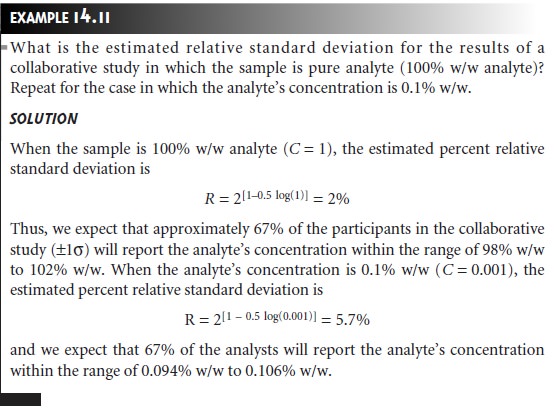Chapter: Modern Analytical Chemistry: Developing a Standard Method
What Is a Reasonable Result for a Collaborative Study?
What Is a Reasonable Result
for a Collaborative Study?
Collaborative testing provides a means for
estimating the
variability (or
repro- ducibility) among analysts
in different labs. If the variability is significant, we can determine that
portion due to random errors traceable to the method (σrand) and
that due to systematic differences between the analysts (σsys). In the
previous two sections we saw how a two-sample collaborative test, or an analysis
of variance can be used to estimate σrand and σsys (or σ2rand and σ2sys). We have not considered, however, what is
a reasonable value for a method’sreproducibility.
An analysis of nearly 10,000
collaborative studies suggests
that a reasonable es-
timate for a method’s reproducibility is
R = 2(1–0.5 log C) …………….14.26
where R is the percent relative
standard deviation for the results
included in the col-
laborative study, and C is the fractional
amount of analyte
in the sample on a
weight-to-weight basis.
For example, when the sample
used in a collaborative
study is 1 ppm (μg/g)
in analyte, C has
a value of 10–6. The estimated percent
rela- tive standard deviation, therefore, is
R = 2[1–0.5 log(10–6)] = 16%
Equation 14.26 appears
to be independent of the type of analyte, the type of matrix,
and the method of analysis.

Of course, equation
14.26 only provides
an estimate of the variability in results submitted by those participating in a collaborative study. A relative standard devia-
tion that is within one-half
to twice the estimated value
suggests that the method
performs acceptably when used by analysts in different laboratories. The percent relative standard deviation for
a single analyst
should be one-half to two-thirds that for the variability between
analysts.
Related Topics